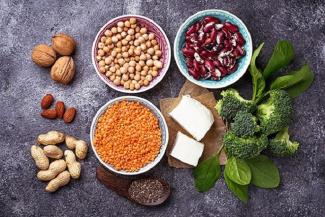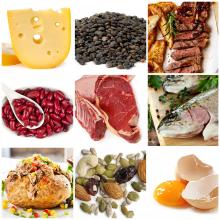
Indians, especially vegetarians often do not get adequate protein in their diet. Registered Dietician, Nutritionist and Diabetes Educator Eileen Canday guides us on how vegetarians can make sure they get enough protein in their diets. An executive member of the Indian Dietetic Association she currently works with Sir H.N. Reliance hospital in Mumbai.
1. Why is protein important for our body?
Protein is important for our body to repair tissues from the physiological wear and tear.
2. How much protein should one consume daily?
Protein requirements depend on the anthropometric measurements, blood parameters, clinical conditions, activity factor and gender. However, for a normal individual with an average weight of 60 kgs, the protein requirements vary between 50-60gms protein per day (0.8-1g/kg body weight).
3. How can vegetarians ensure they are getting optimal amounts of protein?
Vegetarians can ensure getting optimal amounts of protein by consuming adequate amounts of high biological value protein sources like milk and milk products, soya and pulses.
In order to meet daily protein requirements, the amount of protein will depend on the quantity of food consumed and it will vary with age, physiological growth and metabolic requirement.
Read: 8 Must Know Protein Facts
4. What are the best sources of protein per gram for vegetarians especially Indians?
High biological value proteins like milk and milk products, soya and pulses.
More examples of food items and portion sizes per day for vegetarian protein are as follows:
| FOOD ITEMS | AMOUNT |
|---|---|
| Soy | ½ cup |
| Lentils | ½ cup |
| Nuts | Handful |
| Sunflower seed | 1 tbsp |
| Sesame seeds | 1-2 tbsp |
| Quinoa | 1 cup |
| Oats, ragi, bajra | 1 cup |
| Peanut butter | 2 tbsp |
| Chickpeas | ½ cup |
5. How can I add enough protein in a daily vegetarian diet?
Breakfast:- oats/ragi porridge or quinoa salad/ upma/ poha etc with milk or buttermilk
Mid-morning snack: mixed nuts, apple/multigrain cheese sandwich/ rajma cutlet
Lunch: Tofu, legumes/ paneer vegetable with bhakri (sesame seed added in dough) curds and buttermilk
Evening snack: whey smoothie milkshake or paneer tikki or channa chor garam or hummus
Dinner: soy burger, mixed beans OR chickpeas with roti or paneer paratha
Bed-time: cottage cheese/milk
So basically every meal has to have one part of it with protein rich food.
Must Read: Sources of Vegetarian Proteins
6. What is protein deficiency?
Protein deficiency is established when the intake does not meet the daily requirement. Protein deficiency will lead to muscle loss and may lead to Kwashiorkor in children.
7. How do I know if I have protein deficiency?
Signs and symptoms of protein deficiency are constant craving, edema, fatty liver; skin dryness, brittle hair and nails, loss of muscle mass causing weakness, greater risk of bone fractures, stunted growth in children and increased frequency and severity of infections.
8. Do I need a protein supplement if I exercise moderately? Are protein supplements harmful?
Protein supplementation may be required if not met from the food. Protein supplements are not harmful if consumed in adequate amounts and under the guidance of a medical professional.
9. Is there such a thing as "too much protein"? What is the effect /consequence of a high protein diet?
“Too much protein” is established when the intake exceeds the requirements for an extended period of time. The consequence of too much protein contributes to increase in the total fat mass of the body. It can also lead to constipation if fluid consumption is not adequate.







